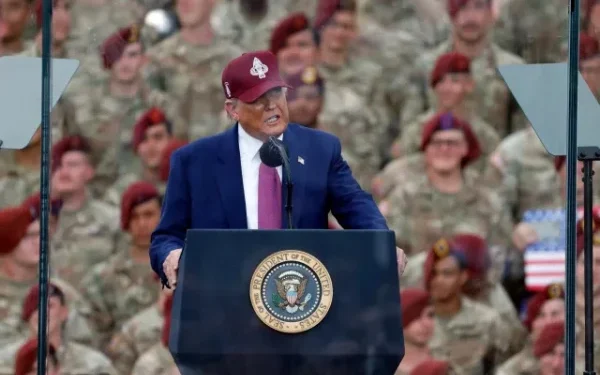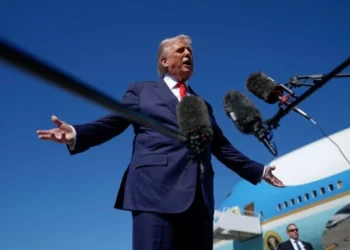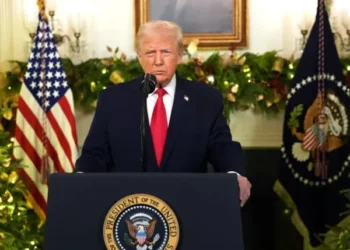North Carolina, USA – In a fiery and resolute speech delivered during a military ceremony in North Carolina, former President Donald Trump took a firm stance on internal security, illegal immigration, violent protests, and border protection. Reaffirming his commitment to law and order, Trump categorically declared that “anarchy will not be tolerated in America” under his administration or future leadership.
Addressing a Nation at a Crossroads
The speech, held at a military event that drew both national and international attention, served as a powerful reaffirmation of Trump’s “America First” agenda. It underscored themes that have become central to his political identity: tough immigration policies, patriotism, military strength, and law enforcement.
With the 2024 presidential elections behind him and speculation growing around the 2028 political landscape, Trump’s words have ignited discussions across the political spectrum, especially as security concerns continue to grow in urban centers across the U.S.
Trump’s Categorical Statement: “Anarchy Will Not Be Tolerated”
Trump opened his address by emphasizing the need to uphold law and order across all American states. He referenced recent violent protests in several cities, where incidents of vandalism, arson, and clashes with law enforcement had shaken communities. According to Trump, these actions pose a direct threat to American sovereignty and unity.
“There will be no tolerance for chaos or destruction. Anarchy has no place in the United States of America,” Trump proclaimed to thunderous applause from attendees.
His comments were widely interpreted as a response to ongoing anti-government demonstrations and civil unrest in cities such as Portland, Seattle, and Los Angeles, where protests related to racial injustice, police conduct, and economic inequality have occasionally turned violent.
Burning the American Flag: Jail Time for Offenders
In one of the most controversial points of his speech, Trump condemned the burning of the American flag, which has been observed in isolated instances during protests. He expressed deep disappointment over what he described as disrespect for national symbols, especially by immigrant demonstrators.
“If you burn the American flag, you will spend one year behind bars,” Trump said, reiterating his desire to pass legislation that would make flag desecration a criminal offense punishable by mandatory jail time.
This proposal, while popular among Trump’s base, has drawn criticism from civil rights advocates, who argue that flag burning is protected under the First Amendment as an act of free expression, according to a 1989 U.S. Supreme Court ruling (Texas v. Johnson).
Illegal Immigration: A Threat to National Security
Shifting his focus to illegal immigration, Trump warned that the southern U.S. border continues to be breached by undocumented immigrants, many of whom he claimed had criminal records or were released from prisons in their home countries before arriving in the U.S.
“Millions of people are crossing our borders illegally. Some of them are hardened criminals—murderers, rapists, and drug traffickers released from jails in foreign countries,” he said, adding that such individuals represent a clear and present danger to national security.
Trump criticized the Biden administration’s immigration policies, claiming they were weak, ineffective, and putting American lives at risk. He vowed to reinstate stricter immigration controls, reintroduce family separation policies, and increase deportations if given the chance to return to office.
Border Security and the “Big Beautiful Project”
Trump highlighted his signature border wall initiative, referring to it as the “Big Beautiful project,” and announced plans to expand border fortifications in key vulnerable areas. He said that over 700 miles of the wall had already been built or reinforced during his administration and vowed to complete the remaining segments.
“Our borders will be protected like never before. The Big Beautiful Wall is a symbol of our determination to defend this great nation from invasion,” he stated.
He also advocated for the use of military technology, drones, and additional personnel at the U.S.-Mexico border, and urged Congress to increase funding for the Department of Homeland Security.
Federal Institutions Under Threat: Death Penalty for Attacks
In a stunning policy proposal, Trump declared that anyone who attacks federal institutions, including courthouses, law enforcement buildings, and federal officers, should face the death penalty.
“If you attack the institutions that uphold American democracy, you attack the country itself. These people must face the highest form of punishment,” Trump said.
The remark appears to be a direct response to attacks on federal buildings during past protests, particularly in cities like Portland, Oregon, where federal courthouses were targeted by protestors.
Legal experts have called this proposal unconstitutional and excessive, citing that capital punishment for property crimes or non-lethal attacks would be legally unsustainable under current U.S. law. However, the statement received a standing ovation from the audience and was echoed by several Republican lawmakers afterward.
Targeting California and Los Angeles Leadership
Trump didn’t hold back in his criticism of California Governor Gavin Newsom and Los Angeles Mayor Karen Bass, accusing them of failing to ensure public safety and allowing cities to deteriorate due to lenient policies.
“We will not stand by while California turns into a failed state. We will restore safety, order, and decency in our great American cities,” he declared.
Citing issues such as rampant homelessness, drug addiction, and rising crime rates, Trump promised federal intervention if necessary. He claimed that the current Democratic leadership in California has failed its citizens and that “America’s cities must be clean, safe, and great again.”
Foreign Investment: Billions from Gulf States
Amid the domestic security concerns, Trump also highlighted his administration’s success in attracting foreign investment, particularly from the Middle East. He said that during his presidency, billions of dollars in investments were brought into the U.S. from Saudi Arabia, Qatar, and the United Arab Emirates (UAE).
“We secured historic deals that brought in jobs, opportunities, and wealth from the Gulf nations. No one has negotiated better for America than we have,” Trump stated proudly.
These investments, according to Trump, played a role in strengthening sectors such as infrastructure, energy, and defense manufacturing.
Political Impact and Public Reactions
Trump’s statements are likely to resonate deeply with conservative voters, especially on issues related to immigration, national pride, and public safety. His rhetoric aligns with Republican priorities and may influence the 2026 midterm elections and the 2028 presidential race, where speculation about Trump’s political ambitions continues to grow.
However, critics have blasted the speech as divisive and authoritarian, arguing that Trump’s proposals risk undermining constitutional protections, immigrant rights, and freedom of speech.
Democratic lawmakers, civil rights groups, and immigration advocates have responded with strong rebukes, warning that such rhetoric can lead to increased polarization, xenophobia, and politically motivated violence.
Conclusion: A Message of Strength or a Path to Controversy?
Donald Trump’s address in North Carolina has once again reignited the national debate on how to balance security with liberty. His call for strict punishments, border enforcement, and a crackdown on protests has energized his supporters, while drawing criticism from opponents who fear the erosion of civil liberties.
Whether viewed as a bold defense of American values or a dangerous shift toward authoritarianism, one thing is certain: Trump’s political presence remains powerful, provocative, and deeply influential in shaping the future discourse of the United States.

























